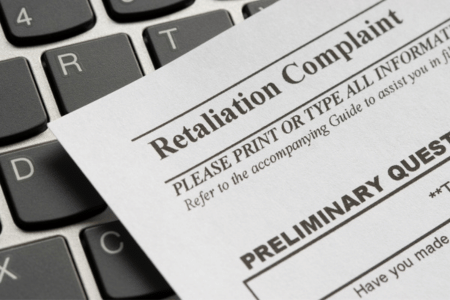Unmasking the Subtle and Blatant: Examples of Workplace Retaliation

However, your employer may be less than thrilled to be the subject of inquiries, investigations, or other attention from outside authorities and agencies. These efforts and their subsequent discoveries can lead to fines and other legal ramifications for your employer.
As you can imagine, not all employers take such attention positively, and yours may choose to retaliate against you.
Although workplace retaliation for engaging in protected activities is illegal, unless you recognize the forms that workplace retaliation can take, you may not recognize when you are subject to it and may therefore miss opportunities to exercise your legal rights.
You must learn to identify different examples of workplace retaliation, become aware of the protections from retaliation available to you under the law, and know the steps you can take when you suspect you are the victim of workplace retaliation.
Recognizing the Different Forms of Workplace Retaliation
Forms of retaliation in the workplace include both overt and covert retaliatory actions. While overt actions are more obvious and easier to spot than covert actions, any form of workplace retaliation involves a negative action that impacts your experience at work and your ability to be productive.
Examples of workplace retaliation can include any adverse action done for the explicit or implicit purpose of punishing you for doing something lawful. Receiving negative comments on employment reviews, being subject to greater scrutiny at work, and being denied vacation time requests are all examples of workplace retaliation, as are being fired or demoted.
Overt Examples of Workplace Retaliation
Overt examples of workplace retaliation include extreme actions such as termination from your employment. When this happens because you engaged in a protected activity like reporting unlawful conduct, it is called wrongful termination.
Being fired shortly after your employer learns of your activities indicates that you may have been the victim of unlawful workplace retaliation.
Other overt examples of retaliation by a manager also affect your job, although not as drastically as being fired. You can be demoted from your present position to a less desirable one for dubious reasons. Similarly, your employer might pass you over for a promotion and give the position to another employee.
These examples of employer retaliation are particularly easy to spot when there are no objective reasons for your employer to take that action.
Covert Examples of Workplace Retaliation
Not all examples of workplace retaliation you might experience are overt and easily recognizable. Sometimes, workplace retaliation is more covert and subtle.
Examples of covert workplace retaliation include being excluded from meetings or workplace gatherings that you would otherwise expect to be invited to attend. Your managers might simply say that they forgot to send you an invite or that a meeting did not concern you rather than admit a retaliatory purpose.
You may also notice that your schedule is altered, and you are given more undesirable shifts. Your employer could deny requests for vacation or time off, citing the needs of the employer, while allowing other employees time off when requested.
Covert workplace retaliation can also include increased scrutiny from your supervisor. You might notice your supervisor watching over you more closely and being more prone to criticize your work. Supervisors and managers will subject you to more frequent discipline, sometimes for minor offenses or violations of company policy.
Legal Protections for Employees Who Experience Workplace Retaliation
When you engage in protected activities like reporting unlawful or unethical behavior committed by your employer, the law protects you from workplace retaliation.
If you reported discrimination or harassment and have been subjected to retaliation, you can file a complaint against your employer with the Equal Employment Opportunity Commission (EEOC) or an equivalent state agency. These complaints can result in additional penalties being assessed against your employer. For other types of retaliation, such as retaliation for whistleblowing on your employer’s illegal behavior, you may file a lawsuit without first filing a complaint with a government agency
You may also be able to file a lawsuit if you were demoted, passed over for a promotion, or fired because of workplace retaliation. Such a lawsuit would compensate you for any monetary loss you experienced due to unlawful retaliatory actions your employer took against you.
You should act quickly to exercise these rights. Document instances of suspected retaliation and then speak to an experienced employment law attorney like those at Wenzel Fenton Cabassa P.A. Your attorney can assist you in taking the next steps in filing a complaint or a lawsuit.
Proving Workplace Retaliation
When you believe you are the subject of workplace retaliation and decide to take legal action, the task before you can seem daunting.
Proving the thoughts and intentions of a manager who overtly engages in retaliatory behavior may seem difficult, and proving intent when the retaliation is covert may seem impossible. But in many workplace retaliation cases, there are sources of evidence that can be used to support a claim.
One source of potential evidence is the email records of your employer. Communication between your managers and supervisors can reveal motive and intent. These written records can be especially helpful if your manager discussed taking possibly retaliatory action against you and a fellow manager or supervisor attempted to talk your manager out of that course of action.
Telephone records can also show when your managers were speaking with one another. Evidence of conversations around the time you experienced workplace retaliation can reveal witnesses who may have more information about your claim, even if no contemporaneous written notes were created. These witnesses can be deposed as to their knowledge of events.
Witness statements from your fellow employees could also help prove your case. Your coworkers may have noticed a change in how you have been treated. If these changes began around the time you started experiencing retaliatory actions, then these witnesses’ statements can support your claim of workplace retaliation.
Your employee file can also yield clues to prove a workplace retaliation claim.
Suppose you enjoyed stellar reviews from your managers until you reported workplace harassment or a safety violation. After your reporting, you began receiving subpar reviews. This sudden change in performance reviews could be persuasive circumstantial evidence that you were the victim of workplace retaliation.
Locating and combing through the various troves of potential evidence can take considerable time. An experienced employment law attorney will know where to look for evidence of retaliation in your case and how to secure that evidence for later use.
How to Respond to Workplace Retaliation
It can be shocking and distressing when you come to feel you are the victim of workplace retaliation. Yet you must remember you are not powerless. There are actions that you can take, and you do not need to wait until you file a lawsuit or get a court order to take them.
You should first begin documenting incidents as they occur. Note the time, date, and circumstances that preceded the action, and then try to be as descriptive as possible about what the incident consisted of. Document any conversations that the perpetrator of the retaliation says to you.
Next, report your concerns to your next-higher supervisor or your company’s human resources department. Bring along your documented incidents so you do not forget information. Your supervisor or HR department should conduct an investigation, whether formal or informal and report to you what steps were taken.
You can also consult immediately with an employment law attorney if you feel uncomfortable going to your supervisor or HR department. Your employment lawyer can investigate your workplace retaliation claims, speak with your employer, and obtain court orders and compensation if necessary.
Whether you decide to speak to your HR department or hire a lawyer, it is best to act quickly. Evidence that could support your workplace retaliation claim can be lost if too much time passes. The sooner you take action, the greater the chances you have of a successful resolution to any claim or cause of action you may pursue.
Working with an Experienced Employment Attorney at Wenzel Fenton Cabassa P.A.

With our deep understanding of employment law and our commitment to your rights in the workplace, we can guide you from determining whether you have been the victim of workplace retaliation to filing a claim and pursuing justice against your employer.
Our firm’s experience includes complex employment retaliation cases, so there is no situation too complicated for our employment law team to handle. The sooner you reach out to us and enlist our assistance, the more positive the outcome can be achieved.
Frequently Asked Questions About Workplace Retaliation
Workplace retaliation and employment law can be confusing. Experienced employment lawyers at Wenzel Fenton Cabassa P.A. are available to answer your questions, including the following:
Am I Experiencing Workplace Retaliation?
Workplace retaliation of any type may not be easy to spot. However, if you notice a change in how your employer treats you after you have engaged in some protected activity, like reporting a safety violation, retaliation may be to blame. Make a note of it and seek help from a knowledgeable employment law attorney.
How Long Do I Have to File a Complaint or Claim for Retaliation?
Depending on your employer, you may have as little as 30 days up to 300 days from the incident date to file a complaint with the EEOC or another government agency like OSHA. If you suffered financial harm and choose to file a lawsuit, the statute of limitation can vary from one year to four years based on the motivation your employer had for retaliating against you. Thus, you must act quickly following incidents of workplace retaliation to protect your rights.
Do I Really Need an Attorney’s Help with My Case?
Legally, you do not need an attorney to file a claim or a lawsuit. However, trying to do so on your own can be time-consuming and fruitless. Skilled employment attorneys like those from Wenzel Fenton Cabassa P.A. can expedite the process of investigating and filing your claim or lawsuit.
Recognizing and Addressing Workplace Retaliation
Examples of workplace retaliation include both overt actions and covert actions, and both types can cause you significant distress personally and disrupt others at your place of employment.
You have legal protections against workplace retaliation, but you must act in a timely way to preserve those rights.
Consult with the workplace retaliation attorneys at Wenzel Fenton Cabassa P.A. as soon as possible about your situation. With years of experience helping Floridians with retaliation cases, both simple and complex retaliation cases, we can help you explore and take advantage of the legal options you have to fight against unlawful retaliation.
Please Note: At the time this article was written, the information contained within it was current based on the prevailing law at the time. Laws and precedents are subject to change, so this information may not be up to date. Always speak with a law firm regarding any legal situation to get the most current information available.
Related Posts
Recent Posts
- False Claims Act Retaliation & Your Rights
- Fired for Being Pregnant? 5 Situations When You Should Call an Employment Lawyer
- Can My Boss Take My Tips? The Laws of Tip Ownership
- What Does “Meets FCRA Requirements” Mean?
- Can Your Employer Contact You While on Medical Leave? Know Your FMLA Rights in Florida
Contact Us

FREE HELP GUIDES
Dealing with unpaid wages, discrimination or wrongful termination? Get the information you need to protect your workplace rights. We offer employment law resources to help you fight for workplace justice.



